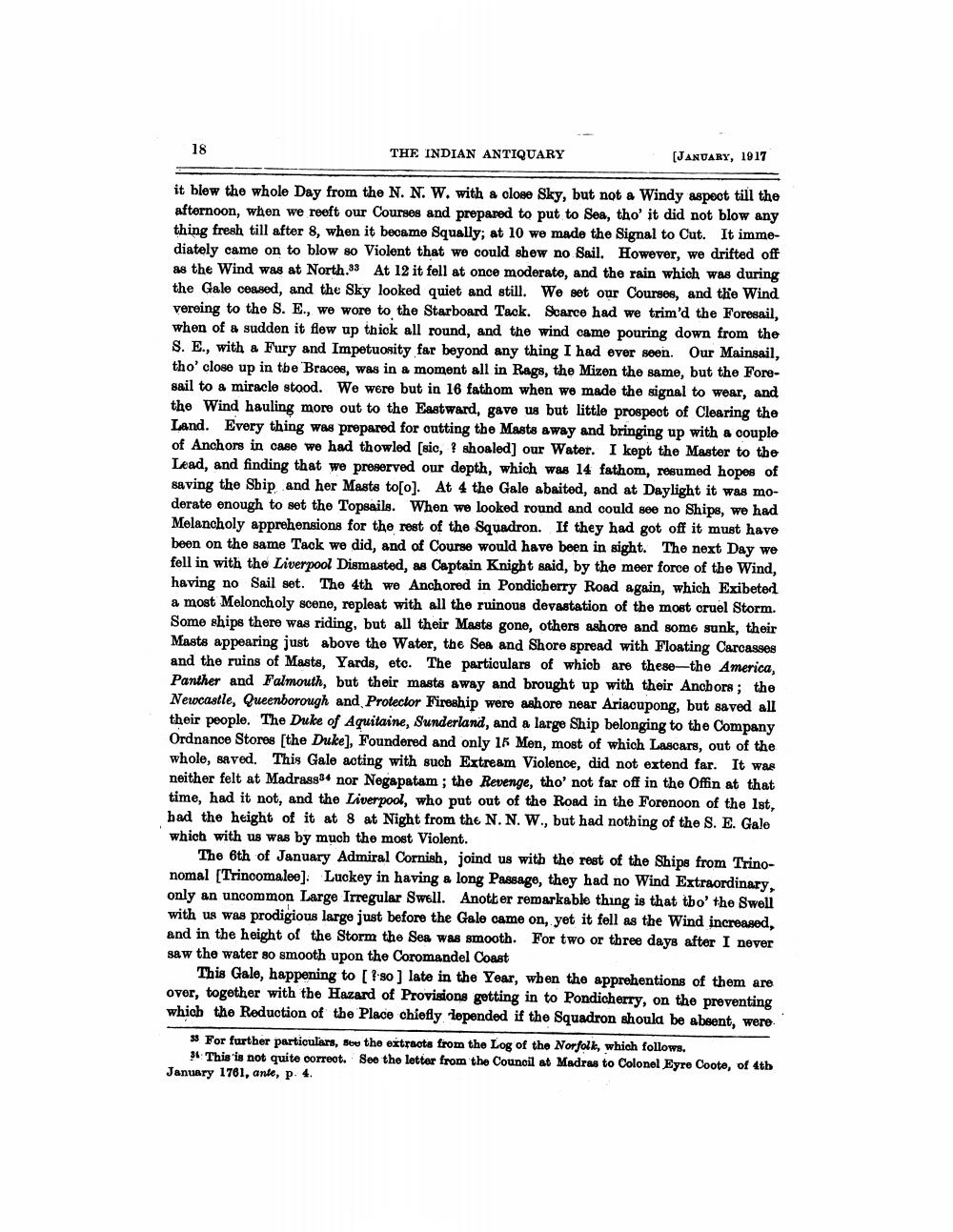________________
18
THE INDIAN ANTIQUARY
(JANUARY, 1917
it blew the whole Day from the N. N. W. with a close Sky, but not a Windy aspect till the afternoon, when we reeft our Courses and prepared to put to Sea, tho' it did not blow any thing fresh till after 8, when it became Squally; at 10 we made the Signal to Cut. It immediately came on to blow 80 Violent that we could shew no Sail. However, we drifted off as the Wind was at North.33 At 12 it fell at once moderate, and the rain which was during the Gale ceased, and the Sky looked quiet and still. We set our Courses, and the Wind vereing to the S. E., we wore to the Starboard Tack. Scarce had we trim'd the Foresail, when of a sudden it flew up thick all round, and the wind came pouring down from the S. E., with a Fury and Impetuosity far beyond any thing I had ever seen. Our Mainsail, tho' close up in the Braces, was in a moment all in Rags, the Mizen the same, but the Foresail to a miracle stood. We were but in 16 fathom when we made the signal to wear, and the Wind hauling more out to the Eastward, gave us but little prospect of Clearing the Land. Every thing was prepared for cutting the Masts away and bringing up with a couple of Anchors in case we had thowled [sic, ? shoaled] our Water. I kept the Master to the Lead, and finding that we preserved our depth, which was 14 fathom, resumed hopes of saving the Ship and her Masts to[o). At 4 the Gale abaited, and at Daylight it was moderate enough to set the Topsails. When we looked round and could see no Ships, we had Melancholy apprehensions for the rest of the Squadron. If they had got off it must have been on the same Tack we did, and of course would have been in sight. The next Day we fell in with the Liverpool Dismasted, as Captain Knight said, by the meer force of the Wind, having no Sail set. The 4th we Anchored in Pondicherry Road again, which Exibeted a most Meloncholy scene, repleat with all the ruinous devastation of the most cruel Storm. Some ships there was riding, but all their Masts gone, others ashore and some sunk, their Masts appearing just above the Water, the Sea and Shore spread with Floating Carcasses and the ruins of Masts, Yards, etc. The particulars of which are these—the America, Panther and Falmouth, but their masts away and brought up with their Anchors; the Newcastle, Queenborough and Protector Fireship were ashore near Ariacupong, but saved all their people. The Duke of Aquitaine, Sunderland, and a large Ship belonging to the Company Ordnance Stores [the Duke), Foundered and only 15 Men, most of which Lascars, out of the whole, saved. This Gale acting with such Extream Violence, did not extend far. It was neither felt at Madrass34 nor Negapatam ; the Revenge, tho' not far off in the Offin at that time, had it not, and the Liverpool, who put out of the Road in the Forenoon of the 1st, bad the height of it at 8 at Night from the N.N. W., but had nothing of the S. E. Galo which with us was by much the most Violent.
The 6th of January Admiral Cornish, joind us with the rest of the Ships from Trinonomal (Trincomalee). Luckey in having a long Passage, they had no Wind Extraordinary, only an uncommon Large Irregular Swell. Another remarkable thing is that tho' the Swell with us was prodigious large just before the Gale came on, yet it fell as the Wind increased, and in the height of the Storm the Sea was smooth. For two or three days after I never saw the water 80 smooth upon the Coromandel Coast
This Gale, happening to [ 8'80 ) late in the Year, when the apprehentions of them are over, together with the Hazard of Provisions getting in to Pondicherry, on the preventing which the Reduction of the Place chiefly depended if the Squadron should be absent, were
For further particulars, Bou the extracts from the Log of the Norfolk, which follows. 34 This is not quite correot. See the letter from the Council at Madras to Colonel Eyre Coote, of 4tb January 1761, ante, p. 4.




